Sudan Conflict Monitor #16

1 August, 2024
The Sudan Conflict Monitor is a rapid response to the war in Sudan written through a peacebuilding, human rights, and justice lens, reflecting on the most important stories in the country. Please share it widely.
Powered by Ayin, Human Rights Hub, and the Sudan Transparency and Policy Tracker
In this issue:
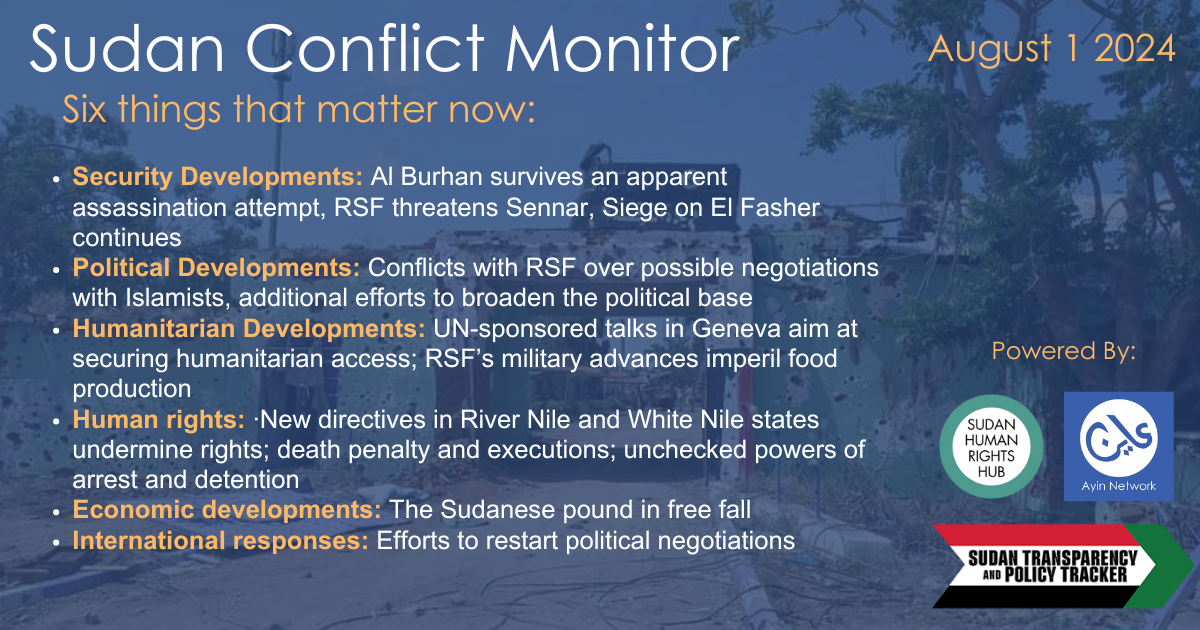
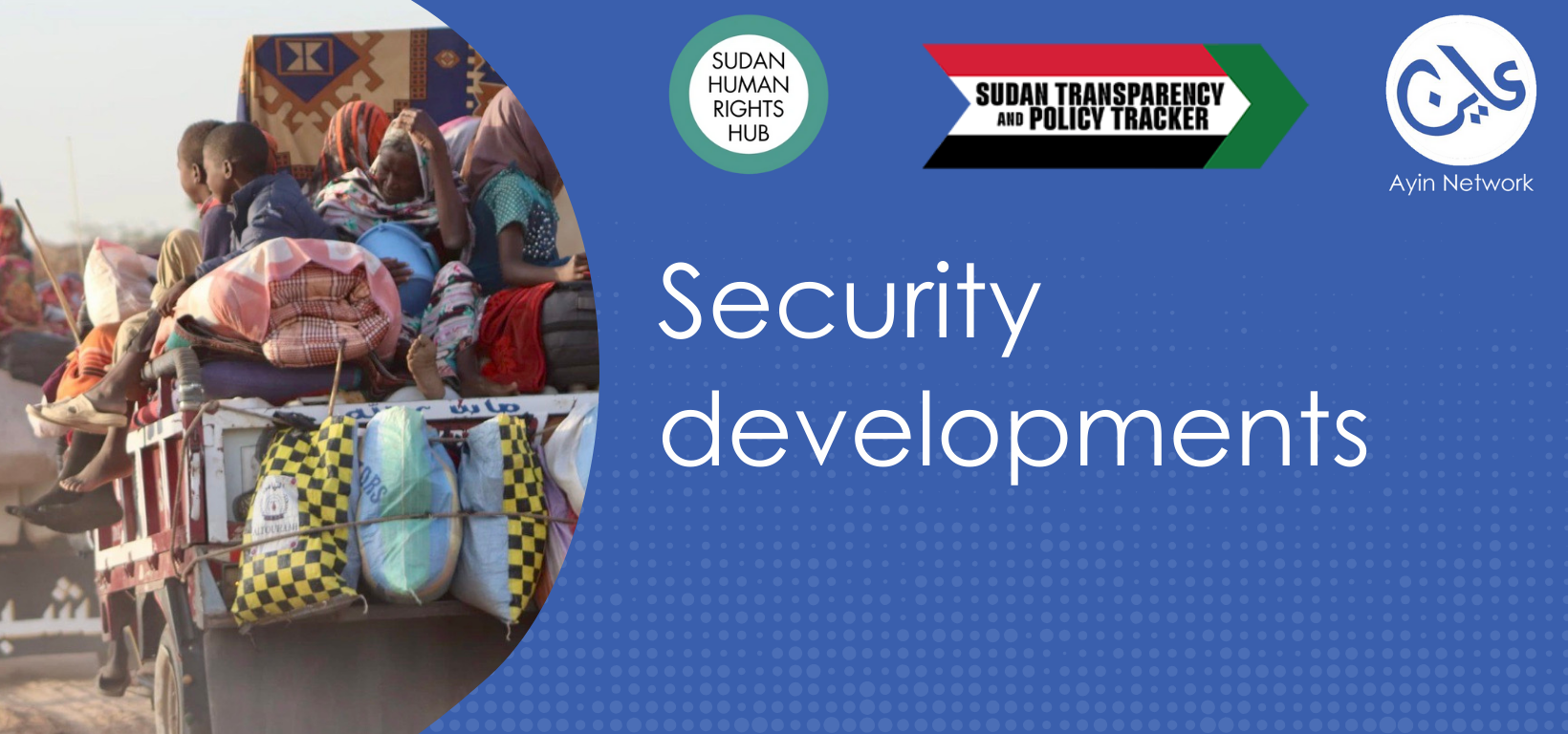 1. Security Developments
1. Security Developments
Al Burhan survives assassination attempt
Lt.-Gen. Abdelfattah Al Burhan survived an apparent assassination attempt on July 31 while presiding over the induction of new SAF cadets near Port Sudan. The drone strike resulted in the deaths of two of his bodyguards and three cadets, according to a statement from the SAF. After the incident, Burhan, dressed in battle fatigues, defiantly declared, “We will not retreat or surrender, and we will not negotiate with any party, no matter how long our battle with the enemy continues.”
The SAF attributed the attack to the RSF, though the latter has not claimed responsibility. Commentators and social media pundits speculated that hardline Islamists might have orchestrated the attack in retaliation for SAF’s conditional agreement to participate in consultative meetings prior to the upcoming Geneva talks (see international response section below). The incident has raised questions about the succession to Burhan’s leadership.
RSF threatens Sennar
After the RSF capture of Sinja and the SAF 17th Division Headquarters on June 29th, the RSF hoped to secure a land corridor to the neighboring Benishangul-Gumuz region of Ethiopia through the Dinder National Park, to benefit from over-land supply lines amid rumors that materiel has been pre-positioned there Benishangul-Gumuz, but have not yet been able to do so. Despite initial successes in forcing SAF to withdraw from its nearby 67th Infantry Brigade and 165th Armored brigade garrisons to the Abu Rakhum dam in the direction of Gedaref state, a coalition of forces from SAF, the General Intelligence Service (GIS) Operations Authority, Darfuri armed groups such as Sudan Liberation Movement (SLM) – Minni Minawi and SLM-Mustafa Tambour, and Tigrayan Defense Forces (TDF) have managed to temporarily hold RSF inside Dinder town.
Interrogations of captured RSF soldiers suggest that at least some RSF units were previously instructed to proceed as far as Gedaref. One RSF commander in particular, Obaid Abu Shottal, who originally hails from Blue Nile State, is reported to have returned to the vicinity of Sinja from Darfur following RSF’s June success and reportedly has ambitions of leading forces back into Blue Nile. RSF, with the support of local communities, quickly gained control of a key staging point in Al-Mazmoum village of Al-Dali locality, Sennar State. Abu Shottal is further believed to have approached various local leaders in Blue Nile to negotiate the withdrawal of SAF’s 4th Division based in Damazin and allied SPLM-N-Malik Agar forces from the state. These negotiations, however, appear to have failed with increased security presence and mobilization by SAF and SPLM-N-Agar reported in the past few weeks.
RSF has also continued its siege of Sennar city, which remains a SAF stronghold, attacking in several waves from at least three directions over the past few weeks. It is also poised to enter nearby White Nile state.
However, the rainy season is severely impeding the movement of infantry and vehicles – maneuverability is a key RSF strength. At the same time, the killing of key RSF commander Abdel Rahman al-Bishi on July 20, by SAF airstrike, has also forced RSF to temporarily re-group in Jebel Moya, Sennar State. RSF has nominated a relative of al-Bishi as his successor, who is now attempting to mobilize recruits from al-Bishi’s Huy Rifa’a tribe to avenge his death.
The Sennar fighting is believed to have displaced 136,000 people eastward, with substantial fear reported among civilians in White Nile, Blue Nile, and Gedaref states. The security threat to eastern Sudan has increased both SAF’s popular mobilization campaigns and engagement with a number of Eastern Sudanese armed groups, inflaming intra-Beja tribal tensions, as some support SAF while others have been accused of supporting the RSF.
Siege of El Fasher continues as fighting moves to western localities
The RSF siege of El Fasher, the capital of North Darfur, keeps a significant number of civilians trapped inside the city. If RSF were to take the city, it would mean they controlled all five Darfur capitals, an important symbolic political victory.
While the situation in El Fasher has calmed somewhat in the past weeks – possibly due to a number of backchannel negotiations between the RSF and local community leadership – ground sources also report RSF have brought new recruits to El Fasher from Nyala with an estimated force size of between 60-100 vehicles. The RSF continued to shell and skirmish with SAF and its allies from positions both inside and surrounding the city while SAF, aligned Darfuri armed groups, and popularly mobilized civilian defenders of the city have largely shifted their positions to the northern neighborhoods of El Fasher and surrounding the SAF 6th Division HQ.
The majority of North Darfur fighting, however, appears to have gravitated toward other parts of North Darfur, specifically the three western localities of El Tina, Kornoy, and Um Baru (majority ethnic Zaghawa area, known as Dar al-Zaghawa), as well as over control of key supply routes along the Libya and Eastern Chad border. This is largely the product of RSF and aligned Arab militia fighting Zaghawa for control over disputed land such as El Zurug, where RSF maintains two separate supply bases and a series of nearby defensive garrisons. In the past week, JEM and SLM-Minawi reportedly amassed 200 vehicles in El Tina, and in Abu Qamra, Kornoy locality, Zaghawa militias clashed with RSF and aligned Arab militias.
RSF and SAF-aligned Darfuri armed groups and Zaghawa militias continue to jockey for control over critical trade and supply routes in North Darfur, increasing insecurity along the coinciding civilian evacuation routes from El Fasher leading to Tawila and El Tina localities. Nevertheless, RSF’s presence inside Mellit, and security arrangements with aligned tribal militias in Malha, ensure its relative presence over the two main gateways of North Darfur trade.
Other frontlines
- On July 1, the eastern segment of Halfaya bridge, linking Bahri and Omdurman, was partially destroyed although it is unclear which warring party was responsible.
- On July 4, SAF forces abandoned the Al-Meiram area of West Kordofan, near Abyei, to South Sudan and withdrew to Aweil in Northern Bahr El Ghazal state of South Sudan. RSF was able to capture significant munitions from the SAF stockpile in al-Meiram and further cement its access to the South Sudan border.
- On July 31, al Burhan survived an apparent assassination attempt when a military graduation he was attending near Port Sudan was targeted with drones. Al Burhan was reportedly unharmed but five people, including students and a general, were killed.
- Fighting continues in other frontline areas such as around Babanusa, in the Greater Khartoum Area, around El Obeid, and across the Kordofan states.
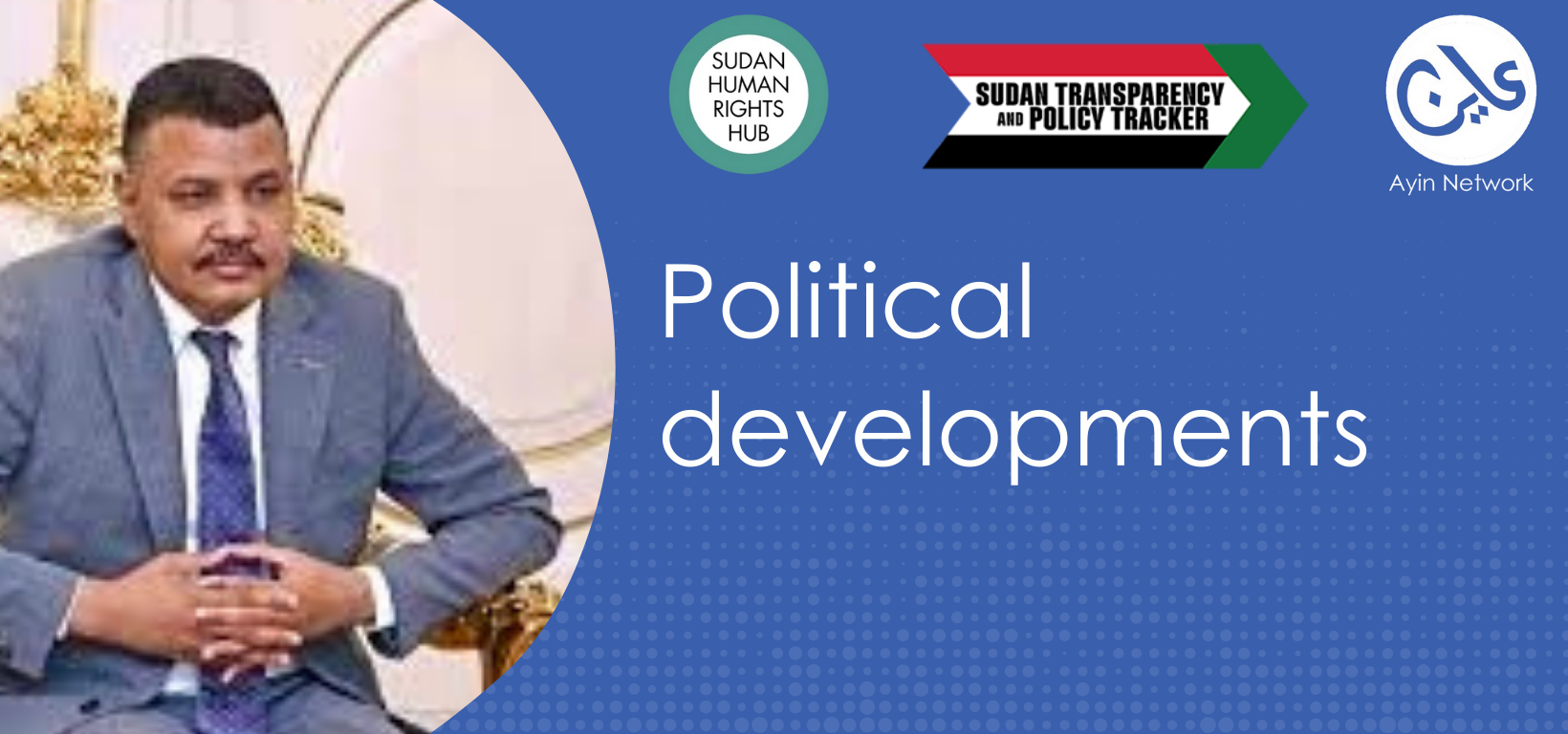 2. Political developments
2. Political developments
RSF leader Mohamed Hamdan Dagalo has fired his political advisor, Youssif Ezzat, after the latter expressed his openness to the idea of negotiating with Sudan’s Islamist former regime in the wake of the July 6-7 Cairo conference of civilians seeking an end to the war. While Ezzat later released an explanation citing his refusal of the RSF Political Advisory Office’s alternative chain of reporting to Hemedti’s brother, Abdelrahim, many speculate the true reason for his dismissal is the position on negotiating with Islamists. Ezzat’s original tweet had called Sudanese Islamists an “original party in the war,” and he later commented that the RSF assumes the SAF leadership to be “following the orders of the Islamic movement.”
Other RSF advisors have firmly rejected the notion that the RSF has been engaging the Sudanese Islamic Movement (SIM), or the former Bashir regime political apparatus – the National Congress Party (NCP) – in direct negotiations. However, rumors of backchannel talks have persisted over the past few weeks. Some rumors are predicated on the fact that Adelrahim Dagalo, a key decision-maker in the RSF Supply Office, has continued to do business with both the UAE and a group of senior SIM financiers after April 15, 2023, in Turkey, where senior SIM leaders such as Muhammad Atta and Sheikh Abdul Hay Youssef are also based. Abdelghafar Sheref, a former general in the Bashir regime’s National Intelligence and Security Service (NISS) who joined the RSF as a security advisor following the 2019 revolution is believed to have traveled to Istanbul some time in the past month. Additionally, reports have recently circulated of posturing toward an attempted reconciliation between SIM Secretary General Ali Karti and Hemedti, initiated by the former, albeit once again staunchly denied by RSF sources.
Potential dialogues between RSF and SIM are in tension with the former’s stated intention of waging the war which they have articulated as being about removing the Islamists. It is notable that the anti-Islamist political position was originally adopted by the RSF on advice from Youssef Ezzat following the October 2021 coup. Sudanese and international media sources have also highlighted many Sudanese Islamists’ alignment with the RSF both before and after April 15, 2023. Most notably the former Bashir Regime Vice President Hasabo Abderahman, who hails from the Rizeigat tribe, was likely expelled from SIM in late 2023 for his support to the RSF. Rumors of Hasabo’s nomination to replace Ezzat as an RSF advisor were denied by RSF sources, but Hasabo remains influential in an advisory capacity on the ground in El Geneina, West Darfur, with multiple sightings alongside Abdelrahim Dagalo in Darfur over the past few months. Other prominent SIM/NCP leaders supporting the RSF include Taha Osman al-Hussein and Abdelghafar Sheref, two security generals who have operated alongside RSF intelligence since Sudan’s transitional period.
Countless other SIM / NCP members, including former participants of various Islamist security bodies such as the Popular Security Service – al-Amna Sha’abi – the Special Action Force Apparatus – Amal al-Khas – and the Popular Defence Forces – al-Difa’a Sha’abi – are now present in the ranks of RSF forces. Some of these individuals, originally hailing from Darfuri communities, appear to have been recruited by the RSF on the basis of communal / tribal / periphery-based narratives, while others have marketed their technical skills to the RSF opportunistically in exchange for hefty salaries. Regardless of motive, however, the presence of Sudanese Islamists in RSF complicates conventional understandings of a binary RSF versus SAF position on Islamists since the start of the April 15, conflict.
In addition, efforts to promote the political coalescence of Sudanese civilians have taken place in July. These include:
Cairo conference
The Egyptian foreign ministry convened a conference of civilian and political actors on July 6-7. The conference was characterized by tensions between the Taqaddum coalition and SAF-aligned groups, which led to the early closing of the conference and SAF-aligned groups refusing to sign the final communiqué, which they criticized as failing to lay the blame for human rights violations squarely at the feet of the RSF.
Addis Ababa conference
The African Union attempted to convene a “Preparatory Meeting to Launch an Inter-Sudanese Political Dialogue Process” meeting in Addis Ababa from July 10-15. Taqaddum and others refused to attend, citing the prominent role played by Bashir allies in the session. Most of those in attendance professed support for the army, although plans were made to expand participation in future sessions. Taqaddum has announced plans to host a separate roundtable in Addis Ababa in the coming weeks.
In a prelude to the Addis conference, the African Union had also organized a Sudanese women’s meeting in Kampala on July 3-4. Similar controversy arose over the participation of a member of the NCP External Relations Office, the former AU Commissioner, who the AU organizers presented as an expert and a widely accused RSF supporter. Controversial attendees were condemned by other participants at the meeting.
Switzerland / Nairobi conferences
The French organization Promediation, supported by the Swiss Foreign Ministry, hosted a civilian meeting in Geneva in early July, with a follow-on component in Nairobi in the weeks following. Participants included both members of Taqaddum and the pro-SAF bloc of civilians, although specific results have not been made public. This series of meetings builds upon an April 2024 civilian meeting, similarly hosted in Switzerland. In addition, the Austrian Peace Center organized a meeting in Nairobi including some armed groups who did not sign the Juba Peace Agreement and political actors with a view to discussing how to broaden discussions on the future of Sudan.
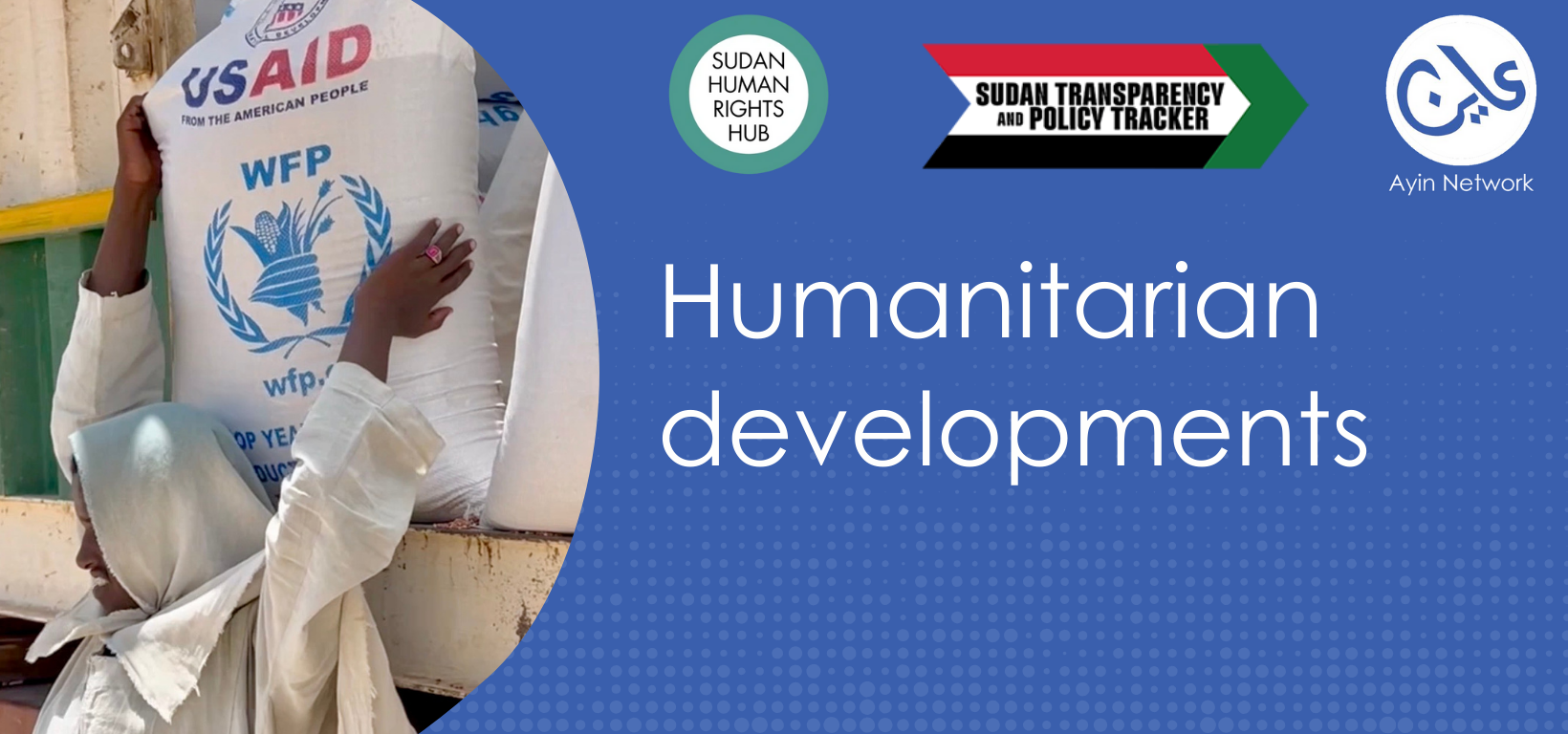 3. Humanitarian developments
3. Humanitarian developments
UN-sponsored talks in Geneva aim at securing humanitarian access
The UN Secretary-General’s Personal Envoy to Sudan, Ramtane Lamamra, and his team led separate talks in Geneva with the government and RSF delegations July 11-19. The bilateral discussions with each party centered on their commitments to allow unfettered humanitarian access to victims of the war across the country and what each could do to improve civilian protection in areas under its control. The talks were mandated by the UN Security Council’s resolutions no. 2724 (2024) and 2736 (2024), which tasked the Special Envoy with facilitating the agreement of the two parties to the conflict to ensure the delivery of humanitarian aid to the millions affected by the war and to take measures to protect civilians.
The goal of the talks was to have each party accept the plans drawn up by the UN and its humanitarian aid agencies. In the end, the RSF unilaterally committed to facilitating humanitarian access in all of the areas under its control, while the government delegation did not.
SAF and the acting government officials aligned with it seem concerned that joint action with the RSF might be perceived as an admission of failure to provide for the population. Additionally, they are concerned that RSF’s involvement in these operations, with its implicit acquiescence, would bolster RSF’s credibility and international recognition as the de facto authority in the areas it controls.
In a closing statement, Personal Envoy Lamamra indicated that one of the parties accepted what was asked of it unilaterally to keep the door open for the Port Sudan Authority to return to humanitarian negotiations. The RSF is seeking political gain by presenting itself as a responsible authority concerned with the fate of citizens in the areas under its control – even if that commitment contradicts the situation on the ground in those areas of widespread attacks on citizens’ basic rights to life and a decent livelihood – while the Burhan government seemingly abandoned this role, giving an easy victory to the RSF.
RSF’s military advances imperil food production
The Al Dinder Emergency Response Room reported that the RSF confiscated seeds, fertilizer and other agricultural equipment, raising concerns that this will further undermine agricultural production in the next season. Meanwhile, Sudanese authorities seem in denial about the looming famine. In a press conference on July 25, the Minister of Agriculture insisted that the food supply was secure. Pointing to a domestic production of 3.1 million tons of sorghum of the average annual consumption needs of 3.9 tons, he dismissed all reports by humanitarian organizations about food insecurity as “inaccurate, lacking credibility, and devoid of numbers.” To underscore that this was a whole of government position, the Minister of Health was at hand, as well as officials from the foreign ministry and the Humanitarian Affairs Commission.
The border crossing at Tine, the only crossing on the Chad border approved by the SAF-led government, has reportedly been cut off by heavy rains, impeding road traffic, adding to concerns about food security in the Darfur region.
Meanwhile, the rapid decline of the purchasing power of the Sudanese pound dramatically increased the prices of essential food supplies, leading the to closure of hundreds of community kitchens feeding the internally displaced across Sudan. The funding shortfall was acutely felt in neighborhood kitchens run by Emergency Response Rooms volunteers in South Khartoum and other parts of the capital. The human rights organization Huqooq reported that Ombada Emergency Room in Khartoum State suspended 45 out of 50 kitchens due to lack of financial support, leaving thousands of families without this vital form of support.
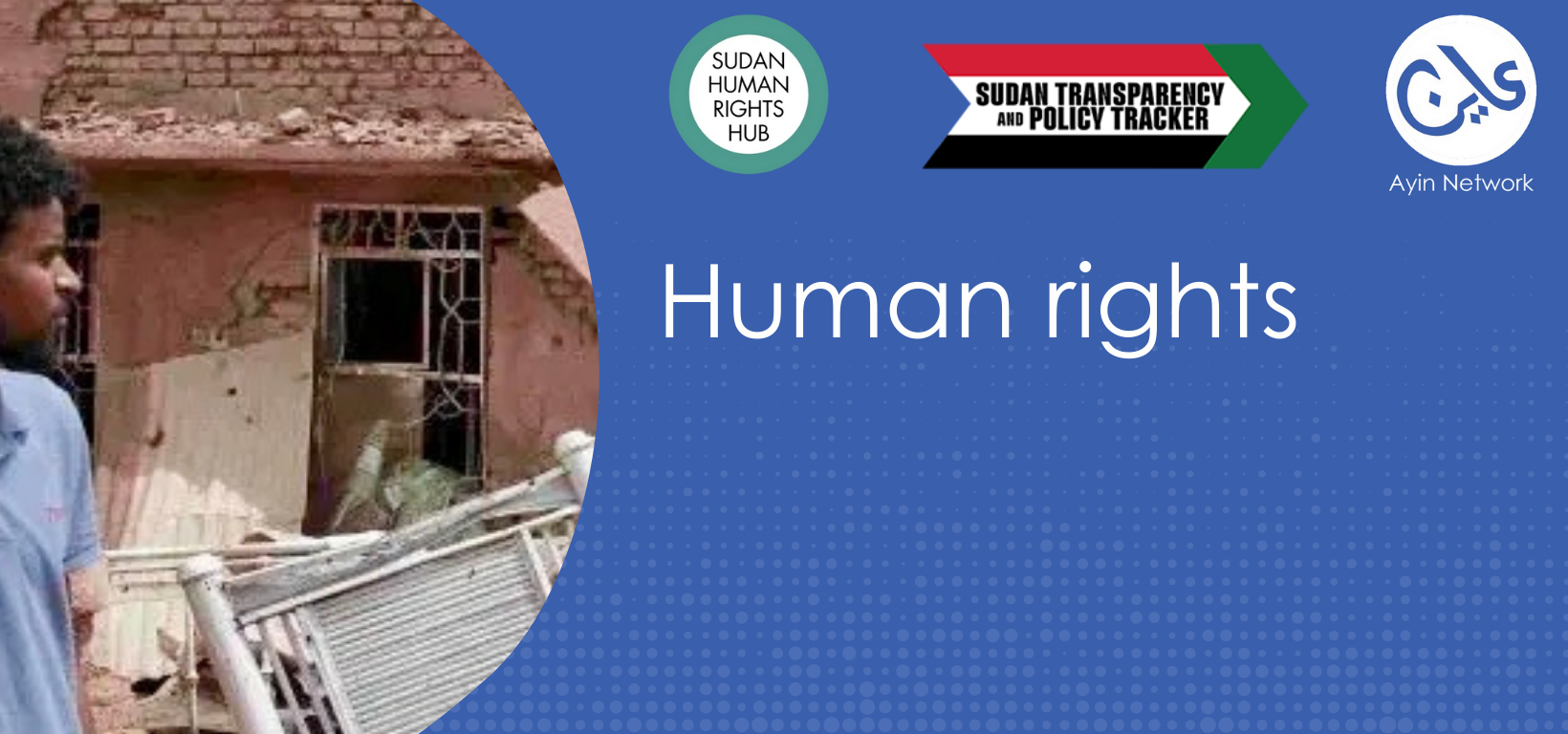 4. Human rights
4. Human rights
New directives in River Nile and White Nile states undermine rights
The SAF-aligned government appears to be intensifying its pattern of cracking down on suspected RSF supporters without safeguards. Addressing members of the High Committee for Mobilization and Popular Resistance, on or around July 22 or 23, the Governor of Kassala State, Ret. Gen. El-Sadiq Mohamed El-Azrak, stated: “There are some people who live among us, join just at prayers in the mosque, but their hearts are not with us. These are the members of the ‘fifth column.’” He then invited attendees to be on the alert to detect and apprehend suspects, “I consider each one of you as an integrated security cell…you should track those who look different, gatherings of youth, people seeking to rent houses or apartments, report them to us so that they could be punished.”
On July 12, the commander of SAF’s 3rd Division in Shendi, River Nile State, said in a televised speech he issued orders to SAF soldiers and internal security units to act decisively if war broke out in the region and inflict “one bullet to the head“ of presumed members of RSF’s “sleeper cells” and those who seek to lower the fighting spirit of the soldiers and the population. Indeed, this appears to be official state policy. Days earlier, the director of the national police in the state addressed a group of supporters by chanting the refrain “bullet to his head” while naming different categories of people who presumably deserve such treatment, including anyone seen riding a motorcycle, waiting to loot property, or engaged in lowering the moral of town’s people.
Coming from the top military and police commanders in the states, such calls amount to an official authorization of extrajudicial killing and an invitation of SAF’s civilian supporters to take action against suspected RSF sympathizers and can be exploited to settle personal grievances as well.
Death penalty and executions
In recent months, courts in SAF-controlled areas sentenced at least six civilians to death, including two women, for supporting the RSF, according to rights groups. The groups cited cases from Blue Nile, Port Sudan and Atbara where courts sentenced men and women to death, reportedly based on social media posts and information found on their phones. The groups also reported that earlier this year a woman in her 60s who had been detained on similar charges died inside a detention center in Atbara, following her imprisonment for more than five months in poor conditions without access to medical care.
In RSF-controlled areas, the groups said, the militia has detained people and carried out summary executions. Media have reported finding houses used as execution rooms in Khartoum. Lists of people sentenced to death, including women, were found in these houses.
Unchecked powers of arrest and detention
Following a visit to Sudan, the UN’s Independent Expert, Radhouane Nouicer, raised similar concerns, noting that so-called “joint security cells” have carried out arbitrary arrests, detentions, and interrogations of numerous people allegedly suspected of affiliation with the RSF and refugees and migrants.
Concern for the safety of hundreds of thousands of Ethiopian and Eritrean refugees in eastern Sudan is growing as fighting approaches the states of Gedaref and Kassala. In particular, accusations by the RSF that the SAF has incorporated former Tigrayan Defense Forces fighters into its ranks raise the stakes for Ethiopian refugees. This prompted Human Rights Watch to call for the safe and voluntary repatriation of refugees facing the greatest risks.
The government security forces also began deporting South Sudanese en masse, many of whom never lived in the territory of South Sudan, amid accusations that some support the RSF. The deportations illustrate the atmosphere of paranoia and xenophobia.
These forces include national security officers who were granted new powers of arrest and detention in May 2024, when authorities passed amendments with retroactive effect to February 2024, much the same as the national security agency had under the regime of former president Omar al-Bashir.
In addition, Nouicer noted “exceptional law enforcement powers under the states of emergency have also been used to arrest civil society actors, including members of Resistance Committees and humanitarian volunteers.” Such frameworks exist in 11 states. In late 2023 and early 2024, several governors issued emergency decrees empowering the security forces to take various repressive actions against any suspected RSF supporters.
The Director General of Sudan’s Prisons Department Police General Yasir Abu-Zaid, announced on July 25 that at the beginning of the war in April 2023, the department released all prisoners and detainees awaiting trial due to an inability to feed and protect them. The last to be freed included deposed President Bashir and top officials of his regime and ruling party who were held pending the conclusion of their trials for various charges.
This statement confirmed details provided by the Minister of Interior, Khalil Basha Sayreen, during an interview on Al-Arabiya/Al-Hadath sister channels on July 13. The Minister stated that the war led to the release of 19,790 prisoners in areas affected by the fighting, including the capital Khartoum. He added that 2,190 of those freed were condemned to death by hanging under Article 130 of the Sudan Penal Code, and another 856 were on death row. These numbers reveal the ease with which the Sudanese judiciary applied the death penalty. The statements from the two officials clarified the issue of which warring party was responsible for the massive release of prisoners. However, the fact of the matter is that both the RSF and the SAF have freed prisoners in towns under their respective control.
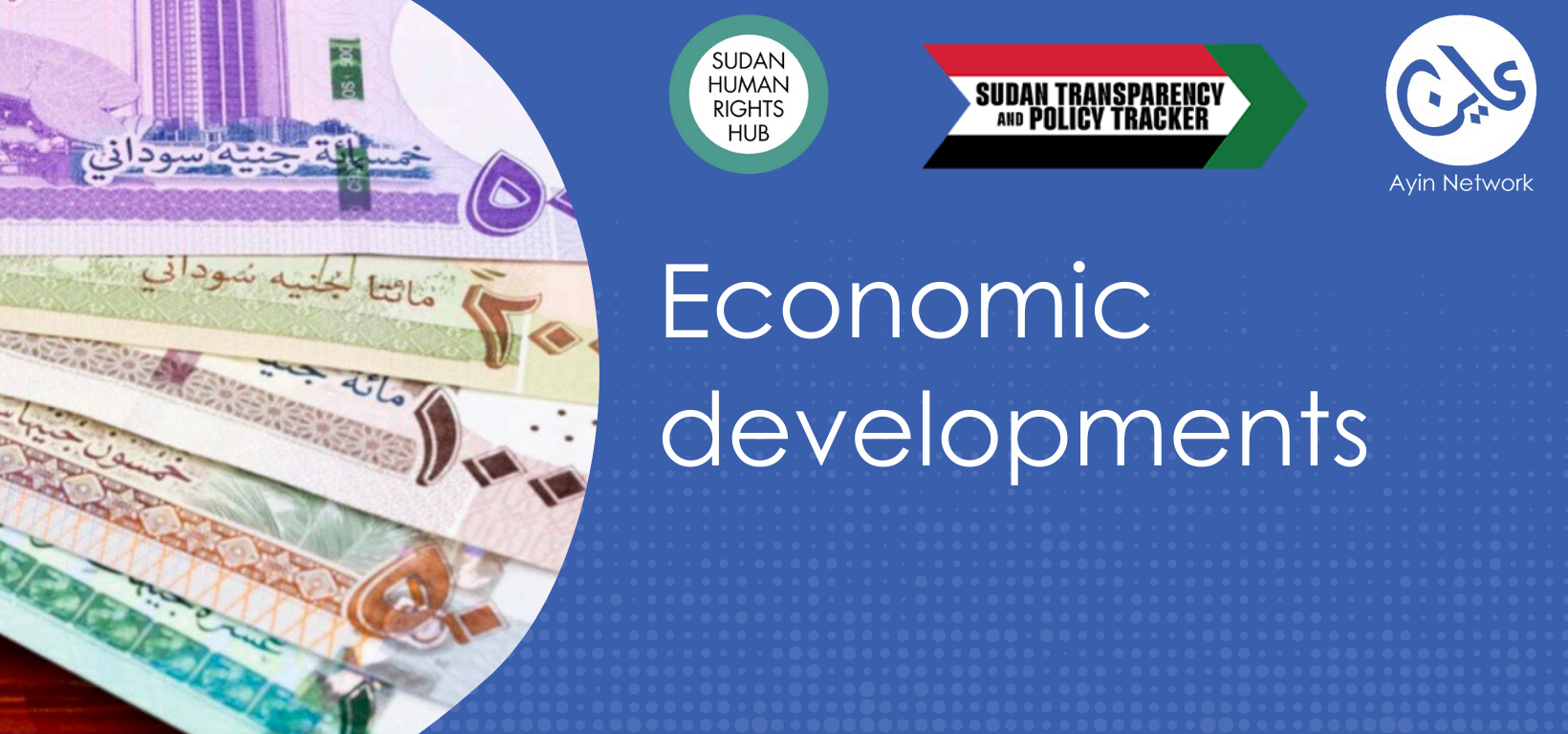 5. Economic developments
5. Economic developments
The first three weeks of July saw a precipitous fall in the Sudanese pound, which, by July 22, peaked at SDG 3,200 to the dollar from SDG 570 to the dollar in the pre-war period. The primary driver of this rapid depreciation is the ongoing war, which is causing the near-total collapse of the formal economy. In a press conference in March, Finance Minister Gibril Ibrahim revealed that the state had lost “more than 80% of its revenue,” with the remainder primarily dedicated to military expenditure, leading him to admit that “military expenditures are bankrupting the state.”
Contributing to the pound’s sharp decline is reportedly a rush to the dollar by the Bank of Khartoum, Sudan’s largest commercial bank, and leading importers. On July 25, the Central Bank of Sudan announced a partnership with the Bank of Khartoum to establish a portfolio with a billion-dollar capital to finance the purchase of strategic commodities, namely refined petroleum products, wheat and wheat flour, agricultural inputs, and medicines. The portfolio aims to stabilize the Sudanese pound and the economy at large, as well as curb inflation.
The CBOS statement indicated that efforts were underway to attract other local and regional contributors to capitalize the portfolio but did not specify who. Another reason for concern is a statement by the CBOS’ governor to the official Sudan News Agency on the corporate governance of the portfolio that indicates a lack of awareness of the notion of conflict of interest: “the portfolio whose general assembly is chaired by the Governor of the Central Bank is subject to supervision and inspection by the Central Bank.”
Local contributors would likely include leading importers facilitating purchases for the SAF. However, foreign shareholders might be discouraged by the risk of their financial contributions being used to subsidize war expenditures. It is also unlikely that the CBOS could rely on self-financing from Sudan’s exports of livestock, gold, and agricultural products.
Atar magazine reported on July 8 that despite the destruction of Sudan’s largest industrial, commercial, and infrastructural enterprises, livestock exports—mainly to Saudi Arabia and Egypt—were thriving, earning a historic record of $879 million since the war began. However, many exporters failed to repatriate and deposit a mandatory percentage of the sale value abroad back into Sudan, leading the CBOS to issue an ultimatum to some 250 companies to comply with its export regulations or face erasure from the registry of exporters. Experts doubted the effectiveness of the ultimatum, noting that the largest livestock and processed meat exporters were companies controlled by the SAF and prominent traders close to the military.
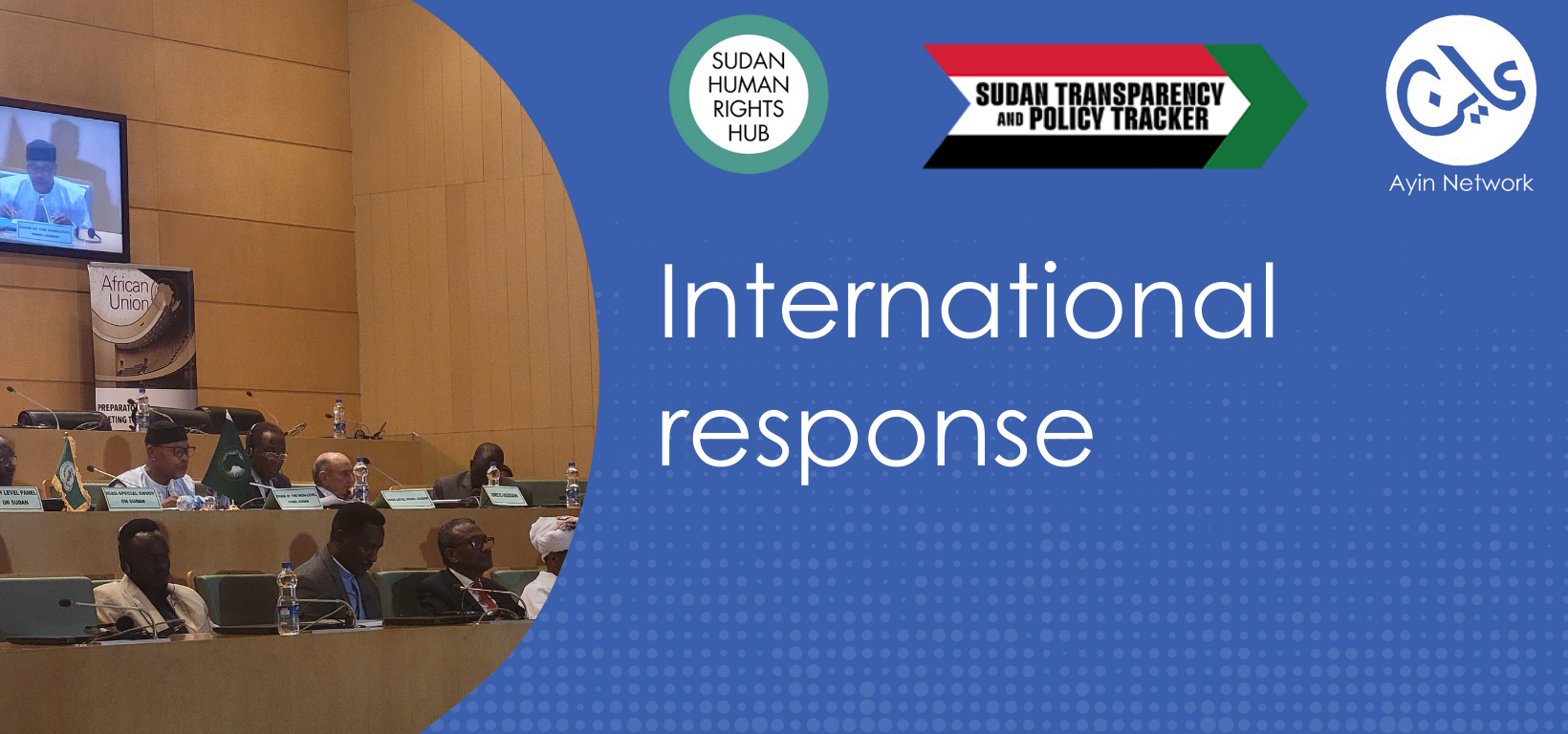 6. International response
6. International response
The start of July was marked by a series of offers from international and regional powers to mediate the Sudan conflict. These included Ethiopian Prime Minister Abiy Ahmed who visited Port Sudan and appears to have brokered a phone call between SAF Commander in Chief Gen. Abdelfatah al Burhan and UAE President Mohamed bin Zayed. There may also be a visit by Egyptian President Abdel Fatah el-Sisi to Port Sudan in the coming weeks. At the same time, Saudi Deputy Foreign Minister Wali bin Abdul Karim al-Khuraiji visited Port Sudan to convince the SAF to rejoin ceasefire talks hosted under the Jeddah Platform, which convened multiple times throughout 2023 with little success. The African Union had also announced a ceasefire proposal featuring mediation from five heads of state, including Ugandan President Yoweri Museveni. The UN humanitarian mediation in Geneva, Switzerland in early July had raised the possibility of a ninety-day “humanitarian pause” to fighting, a proposal which had been staunchly rejected by at least one of the two warring party delegations.
While robust international and regional engagement with Sudan’s warring parties demonstrates a positive increase in political willpower geared towards ending the April 15 conflict, multiple uncoordinated offers for mediation raise the possibility for forum shopping, in which warring parties can refuse participation in talks with the expectation that future negotiation offers may be more favorable to their respective sides. UN Personal Envoy Ramtane Lamamra has convened a “Mediator’s Retreat” in Djibouti in the last week of July, with participation by a number of international and regional diplomats, aimed at resolving these coordination challenges.
On July 23, the United States announced its intentions to launch a joint mediation on August 14, alongside Switzerland and Saudi Arabia, with observers from the AU, UN, Egypt, and the UAE. These talks are designed to be an extension of the past year’s Jeddah platform, with ceasefire and strictly non-political goals in mind – specifically 1.) Nationwide cessation of violence, 2.) Humanitarian access to populations in need, and 3.) Development of a robust monitoring and verification mechanism in ceasefire implementation.
Questions remain as to whether the warring parties both feel ready to accept a return to ceasefire talks, especially as RSF has made advances on the battlefield over the past month, and furthermore whether the parties trust the US, Switzerland, and Saudi Arabia as joint mediators in satisfying their expectations and holding the capacity to sufficiently implementing any potential agreement. Indeed in a statement issued July 30, the SAF seemed to indicate that it would not participate noting the structure’s similarity to Jeddah and calling for consultation with the goverment of Sudan before convening. On the other hand, elements of both the Sudanese and international community optimistically note an upgrade in high-level diplomatic attention – specifically headlined by US Secretary of State Antony Blinken – and the presence of UAE and Egypt has regional backers of the warring parties as observers to the talks.



